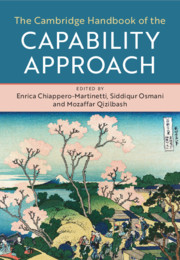Book contents
- The Cambridge Handbook of the Capability Approach
- The Cambridge Handbook of the Capability Approach
- Copyright page
- Dedication
- Contents
- Figures
- Tables
- Contributors
- Foreword
- Acknowledgements
- General Introduction
- Part I Historical Antecedents and Philosophical Debates
- Introduction to Part I
- 1 The Capabilities Approach and the History of Philosophy
- 2 Karl Marx and the Capabilities Approach
- 3 Utility and Capability
- 4 Intellectual History and Defending the Capabilities Approach
- 5 Sen, Smith and the Cambridge Tradition
- 6 The Capability Approach to Well-Being and Freedom from the Viewpoint of Welfare Economics and Social Choice Theory
- 7 Resources or Capabilities?
- 8 Taking Multidimensionality Seriously
- 9 The Capabilities Approach and Political Liberalism
- 10 Selecting a List
- 11 Individualism and the Capability Approach
- 12 The Politics of Wonder
- Part II Methods, Measurement and Empirical Evidence
- Part III Issues in Public Policy
- Index
- References
4 - Intellectual History and Defending the Capabilities Approach
from Part I - Historical Antecedents and Philosophical Debates
Published online by Cambridge University Press: 11 November 2020
- The Cambridge Handbook of the Capability Approach
- The Cambridge Handbook of the Capability Approach
- Copyright page
- Dedication
- Contents
- Figures
- Tables
- Contributors
- Foreword
- Acknowledgements
- General Introduction
- Part I Historical Antecedents and Philosophical Debates
- Introduction to Part I
- 1 The Capabilities Approach and the History of Philosophy
- 2 Karl Marx and the Capabilities Approach
- 3 Utility and Capability
- 4 Intellectual History and Defending the Capabilities Approach
- 5 Sen, Smith and the Cambridge Tradition
- 6 The Capability Approach to Well-Being and Freedom from the Viewpoint of Welfare Economics and Social Choice Theory
- 7 Resources or Capabilities?
- 8 Taking Multidimensionality Seriously
- 9 The Capabilities Approach and Political Liberalism
- 10 Selecting a List
- 11 Individualism and the Capability Approach
- 12 The Politics of Wonder
- Part II Methods, Measurement and Empirical Evidence
- Part III Issues in Public Policy
- Index
- References
Summary
For Martha C. Nussbaum, the history of political philosophy possesses philosophical value for reasons that are seldom explicitly argued. It is not so much that past political philosophers are worthy of our attention primarily because they identified philosophical problems that we continue to consider significant. Rather, we should pay especially close attention to those who also managed to arrive at solutions to these problems similar to our own. Their significance for us stems less from the fact that we recognize their purported philosophical problems as our own problems and more from the fact that we sometimes discover their purported solutions to these problems mirroring or overlapping with our own. Consensus with the dead warrants philosophical claims as much as consensus with the living. For Nussbaum, discovering that T. H. Green’s philosophical liberalism emulates her version of the capability approach warrants its credibility. Intellectual history is sometimes philosophically very useful. The hermeneutical conundrums raised by this manipulation of intellectual history are considerable.
Keywords
Information
- Type
- Chapter
- Information
- The Cambridge Handbook of the Capability Approach , pp. 76 - 91Publisher: Cambridge University PressPrint publication year: 2020
